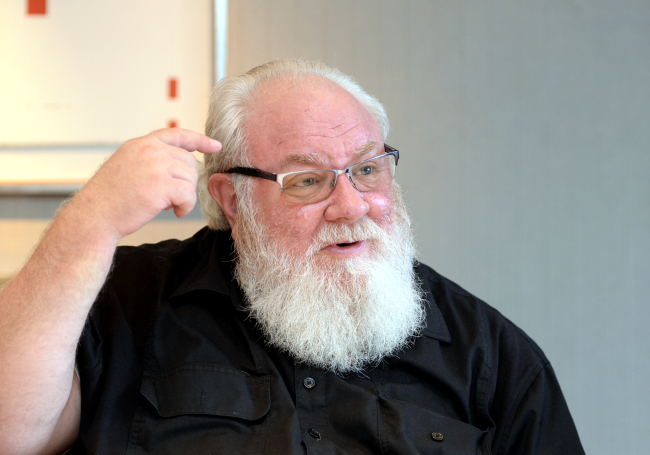South Korea must adopt more rigorous regulations over the development, possession and management of botulinum toxin used for anti-wrinkle treatments, neurotoxin expert Eric A. Johnson has warned.
Johnson, a bacteriology professor at the University of Wisconsin-Madison who co-developed the world’s first botulinum toxin for therapeutic and cosmetic use, said that lax regulation of botulinum toxins could hurt Korea’s global reputation in the industry.
“My understanding is that the same sort of rigor (required for those possessing botulinum toxin in the US) is not in place in Korea,” Johnson told The Korea Herald during his recent visit to Seoul.

Eric A. Johnson, a professor of bacteriology at the University of Wisconsin-Madison, speaks during an interview held in Seoul last week. (Park Hyun-koo/The Korea Herald)
Botulinum toxins, often referred to generically as BTX or by the brand name Botox, are used in injectable treatments to smooth out wrinkles. With the right dosage, the toxin can reduce wrinkles as well as treat medical ailments like muscle spasms and eyelid tics.
At the same time, botulinum toxins -- produced by the clostridium botulinum bacterium -- include the most lethal toxins known to humans. The neurotoxin can cause botulism, an illness that paralyzes muscles and can be fatal, and is subject to strict regulations in other countries.
For instance, every person who handles BTX in the US must undergo special training and a criminal background check. When developing or transferring a BTX strain or toxin, it must be reported and approved by the US’ Centers for Disease Control and Prevention, which documents and closely monitors BTX possession by type and amount.
But Johnson said that Korea not having the same level of safeguards in place poses risks to public safety and security.
“(In Korea), strains can be isolated from different locations and brought back to the lab, and you don’t necessarily have to document the toxin’s development process, how much toxin you’ve produced and used for research and such,” said the 61-year-old toxin expert.
“So there seems to be a number of potential changes that could heighten the security,” he added.
The lack of regulations has also led to commercial disputes in Korea.
Johnson’s remarks come amid rising calls for Korea to ramp up its toxin regulation system, initiated by a long-running dispute between Korea’s botulinum toxin makers over the source of the bacterial strain that produces botulinum toxin type A.
Seoul-based Medytox, Korea’s largest maker of type A BTX, says it is the only Korean company to have developed BTX products using legitimately attained strains.
The company recently filed a lawsuit alleging local drugmaker Daewoong Pharmaceutical stole Medytox’s bacterial strain and master manufacturing process to develop its type A botulinum toxin Nabota, which is currently approved and sold in Korea.
Medytox asserts that Daewoong -- alongside nearly a dozen Korean companies said to be in possession of the type A BTX-producing bacterial strain -- did not discover the strain from nature as claimed, but acquired it via dubious routes made possible due to lax state supervision.
Johnson said it was surprising so many companies in Korea have acquired the type A botulinum toxin strain, since the source bacteria is not an organism commonly found in Korea.
The danger BTX poses as a neurotoxin is such that it is classified as a bioterrorism agent alongside substances like anthrax and smallpox in the US, and categorized as a biological weapon under international law. This means it would be hard for rival companies to acquire the bacteria from overseas since there are such heavy restrictions on moving it between countries.
There are just four major companies globally that develop and sell type A botulinum toxin for therapeutic and cosmetic uses: Allergan, Ipsen, Merz Pharma and the Lanzhou Institute of Biological Products.
Looking ahead, the neurotoxin expert advised that each Korean company developing botulinum toxin for human use be mandated to submit documents detailing the complete development history. This is not only to avoid theft allegations, but also to prove the toxin was discovered, isolated and purified in a safe way for human injections, he says.
“I think with an agent that makes the most poisonous substance known, there should be laws regulations in place that you can’t get it or make it without the state’s approval. There has to be a chain of custody and inventory over the toxin,” Johnson said.
“In the end, Korea doesn’t want to develop a bad reputation internationally of very freely distributing toxins for injection into humans.”
By Sohn Ji-young (
jys@heraldcorp.com)






